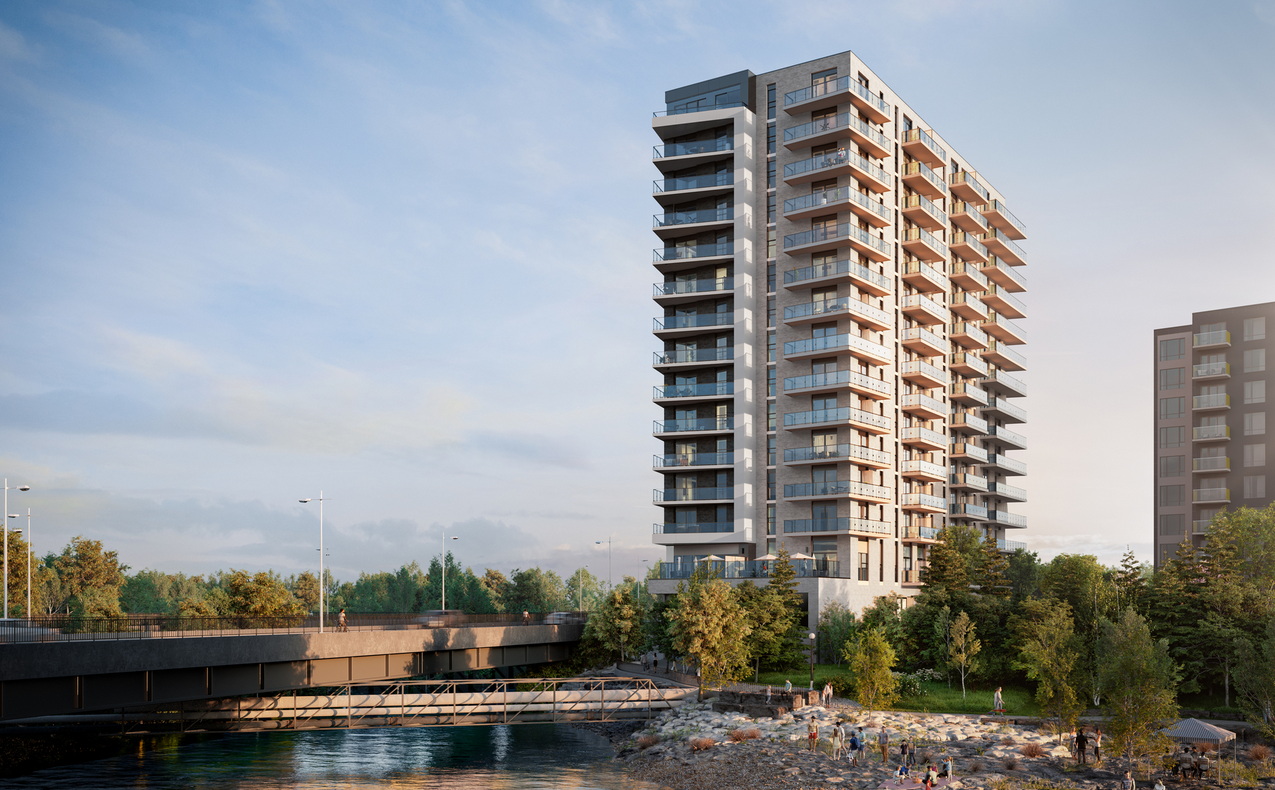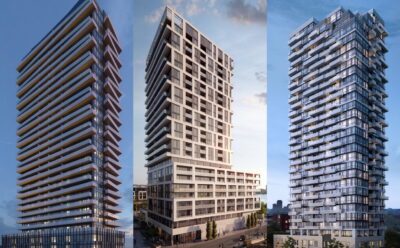Eco-conscious rental living has come to Zibi.
The sustainable redevelopment of the former Domtar and E.B. Eddy site straddling the Ottawa River between downtown Ottawa and Gatineau has reached a new milestone with the opening of its first rental apartment building, as well as the completion of the self-contained energy plant that will run everything in the 34-acre project.
Called Aalto — meaning wave — the 15-storey rental tower is built on top of the energy plant so that the plant does not impede the stunning views no matter which side of the building you’re on.
“We really see this building as a cornerstone of the community’s Net Zero ambition,” says Justin Robitaille, who is vice-president of development at Dream Unlimited, which is building Zibi. It’s such a cornerstone that a viewing gallery facing Eddy Street let’s you see into the plant that takes up much of the building’s basement.
“We wanted this to be highly visible for people; we want sustainability on display,” says Robitaille. “We look at it as an opportunity to really demonstrate how we’re getting that done at a community scale, which is really the first of its kind in the region.”
Known officially as the Zibi Community Utility, the district power plant is a partnership between Dream, Theia Partners and Hydro Ottawa that relies on energy recovery from effluents from the nearby Kruger Products tissue plant for heating and the Ottawa River for cooling, he says. The system will provide zero-carbon heating and cooling for all Zibi tenants and residents.
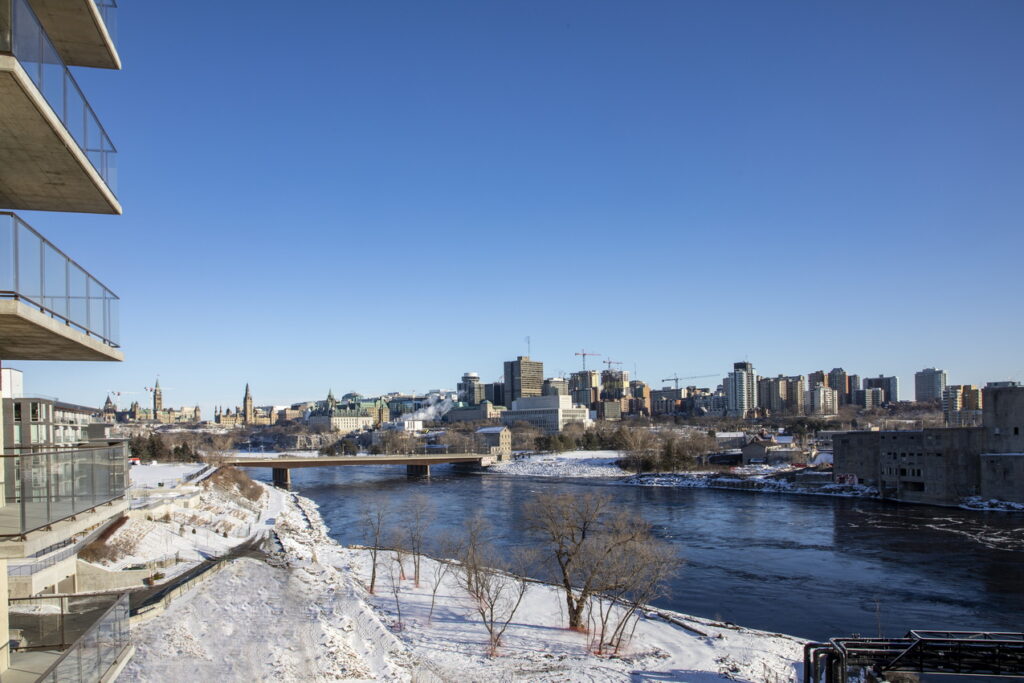
The power plant and the rental building built on top of it speak to the uniqueness of Zibi. A residential tower with a power plant in the basement is not a common thing. And the revival of the area unlocks prime waterfront vistas and property that have been hidden from view for a century.
But the project also takes a holistic approach to development. It’s mindful of Aboriginal sensitivities (the land is unceded Algonquin Anishinaabe territory), it preserves as many of the site’s historic buildings as possible, it restores much of the shoreline to a natural state, and it emphasizes inclusive development in creating a community for all — and one that embodies a lifestyle of living, working and playing in your community.
The development is Canada’s first designated One Planet Community, an initiative developed by U.K.-based charity BioRegional and the World Wide Fund for Nature to promote improved stewardship of the Earth’s resources. It follows 10 principles that guide community development, “everything from zero-carbon energy to reducing waste consumption and generation,” says Robitaille.
Keeping to that approach is important to Dream and the Zibi team. Attention is paid as much to small things, such as promoting health and happiness by ensuring Aalto’s theatre room is stocked with movies or the games room has board games, as it is to the big things, like building a self-contained energy plant so that all buildings can be carbon neutral.
“Zibi is committed to achieving a number of sustainability criteria through the One Planet Living framework,” Robitaille says. As a result, Aalto “is a testament to some of our commitments.”
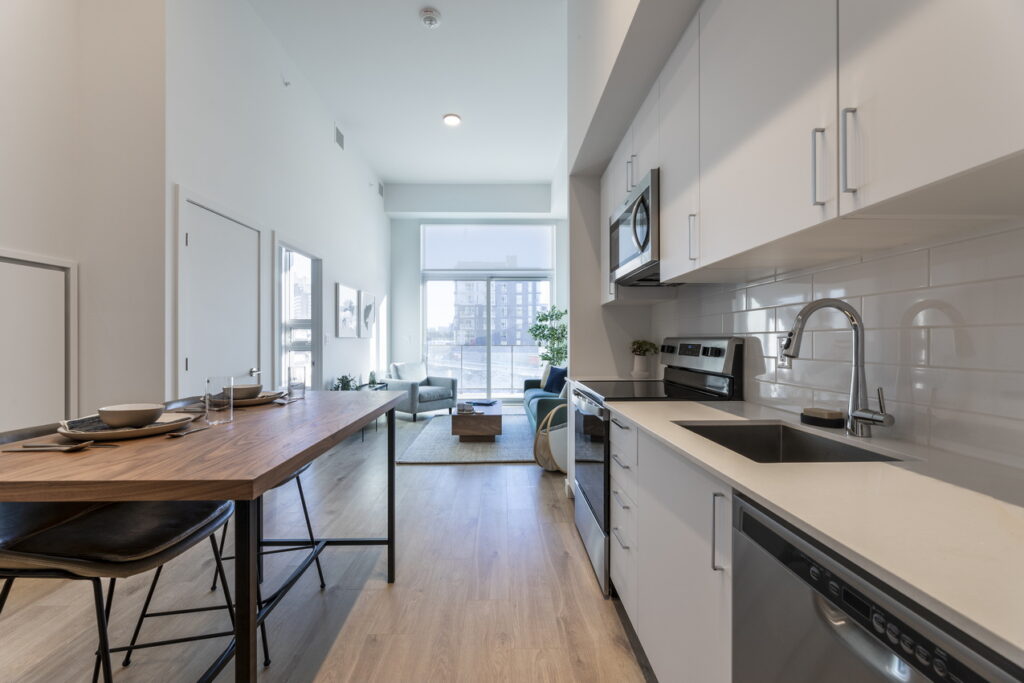
The building offers 162 one-bedroom, one-bedroom-plus-den and two-bedroom apartments, ranging from 503 to 1,007 square feet, and there is a mix of accessible, affordable and market-rate units. All come with six appliances, including in-unit laundry, bike storage and access to storage lockers. Rents for available units start at $1,425 for a one-bedroom apartment.
Building amenities, all with generous terraces overlooking the Chaudière Falls, include a co-working space, fitness centre, theatre room, games room and party room with full kitchen.
“What we’ve noticed, especially during the pandemic, is that renters are really looking for more versatility in their living accommodations,” says Robitaille. “We’ve really tried to accommodate a lot of their living needs within the building itself.”
Because of the energy plant in the basement, there is no parking garage, but parking will be available in the rental building that’s under construction next door. In the meantime, there is surface parking close by.
For early tenant Hamza Balafrej, who moved in Dec. 1, being able to rent in a new, modern and well-equipped building was a big draw, as was its sustainability features and, of course, “the view is amazing,” he says. His west-facing apartment overlooks the Chaudière Falls. “In the summer, I can put my new chairs on the terrace and enjoy the nice view.” (East-facing units see Parliament Hill.)
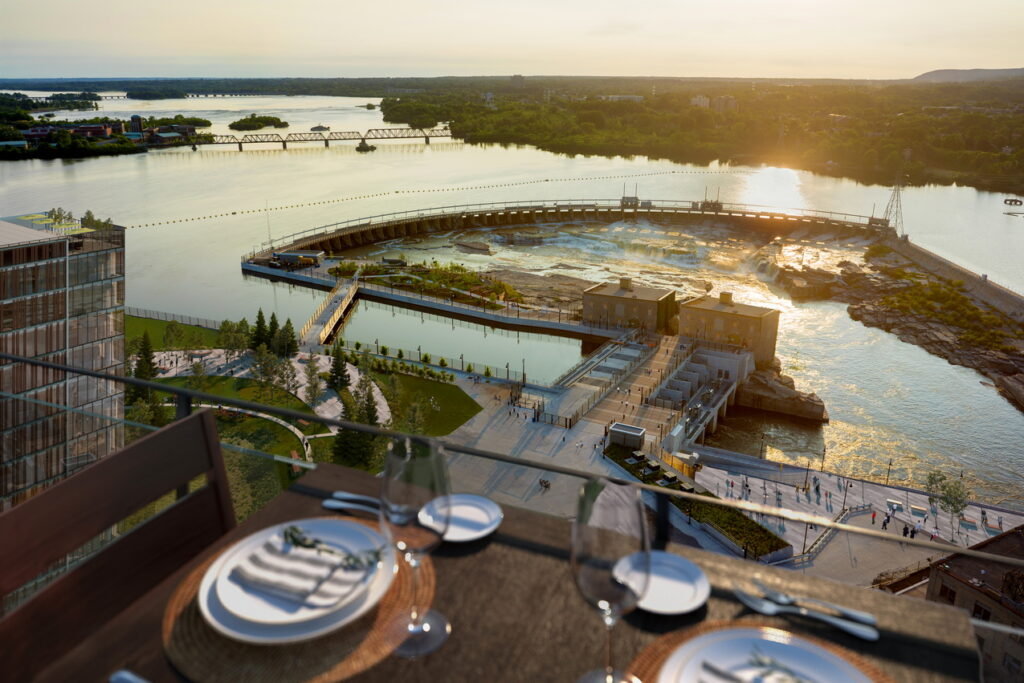
Zibi, which launched in 2015, is now about 20 per cent complete, Robitaille says. Of the 40 buildings that will eventually be built to house a mixture of residential, commercial and retail, about eight are now done.
Retail is slow to gravitate to the site, hampered by the pandemic, but Robitaille says Dream is in talks with restaurants for both sides of the river and has brought in pop-up retail in the past, something it continues to explore.
A few office buildings have been completed. Early tenants include the federal government, IBM and the co-working company Spaces.
Some public spaces are also done. On the Ottawa side, Head Street Square is the main public plaza and gathering space for Zibi, while Pangishimo Park sits on the western tip of Chaudière Island. There is also now access to the falls themselves. Later this year, Tesasini Park and a bike pathway along the river are expected to open in Gatineau.
And, of course, there’s the popular Interzip Rogers zipline over the Ottawa River that opened last year. “I definitely recommend it,” says Robitaille, who has been on it, noting its adrenalin rush.
Up next are more rental buildings for both Gatineau and Ottawa, including one that is expected to offer a couple floors of co-living. The co-living units would likely combine three to five individually rented bedrooms with shared common space.
“These are fully furnished units (with rents) lower than a traditional one-bedroom,” Robitaille says.
But it will be a while before there are more condos. There are still a handful of units available in the first two condo buildings built (O in Gatineau and Kanaal in Ottawa), but Robitaille expects it will be three or four years before new condos are introduced.
